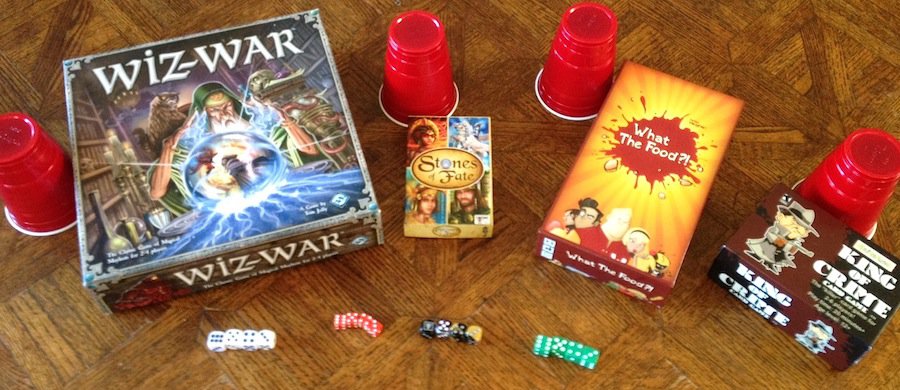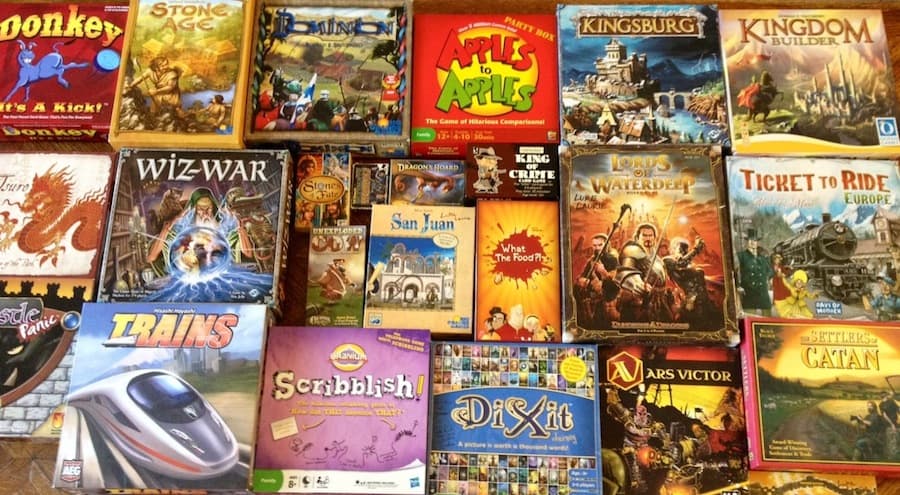
Maintaining a balance between work, recreational activities, intellectual pursuits, and home life can be a challenge for any family. However, being a dedicated geek, gamer, and/or game designer doesn’t have to mean you must live in a van down by the river. We don’t want our favorite hobby turning people into gamer widows and gamer widowers.
In this open-ended series, I’ll discuss issues related to balancing family life and gaming, with a special emphasis on the challenges of being a game maker. Game makers face unique challenges as spouses and parents, but we also have fantastic opportunities to have bonding experiences with our families while enjoying our love of games.
Family, for me, is my wife and two kids, and I write from that perspective, but I hope that you can find value in these pieces regardless of how you define your family. I use the term spouse in this piece in a generic gender-neutral sense, feel free to substitute partner, significant other, or any other term that is appropriate to your life.
In this installment, I’ll focus on the following topics:
- FAMILY COMES FIRST
- TAKE CARE OF YOURSELF
- PLAY GAMES WITH YOUR FAMILY
FAMILY COMES FIRST
Spend time with your kids, go on dates with your spouse, take care of all that mundane stuff to keep the wheels turning in your household. Turn household chores into collective activities that the kids are a part of. Cleaning the kitchen, doing the yard work, and folding the laundry can all be “Gamified” by keeping track of points, paying allowance, using timers to track speed. Teach your kids skills and responsibility, make your home-making machine more efficient, take the burden off of the adults, and practice working together. Everyone in the household benefits from fulfilling obligations, so each person should contribute to fulfilling those obligations.
A FAMILY THAT WORKS TOGETHER HAS MORE TIME TO PLAY TOGETHER.
If all of your gaming and game design takes you away from your family, you likely have an unsustainable pattern, that could cause deep rifts between you and your kids and/or spouse. Be conscious of the kinds of games you play and the types of projects you embark upon. Your choices of games, projects, and travel may be opportunities for fun and connection with your family. If you have to push your family away to make gaming happen, the costs may outweigh the benefits.
Find ways to schedule gaming events so that they don’t interfere with prime family time. If you can, bring your family with you and encourage their participation in gaming events. Make gaming events family events. If you know other families that game, get the families together so that kids can be free to play games or do other activities, and everyone can have an enjoyable time together. If you’re working on game design, see if you can do that while your spouse is doing their own work and pursuing their own creative endeavors, so that you’re not sacrificing time for you to be close.
A CAUTIONARY TALE
I used to play a lot of Dungeons and Dragons. Every week, I would have a bunch of friends over, take over the dining room and adjacent living room, and demand a minimum of distractions to have a smooth running and immersive campaign. My son was a part of some of those adventures, but my wife and my daughter were not. Essentially, at least half of my family would be left out of this weekly activity, and the presence of DnD in our house on a Sunday afternoon limited in what activities my family could do together. In addition, because I was the dungeon master, I would spend countless hours writing custom adventures, building models, painting miniatures, and so on, to breathe as much life into my adventures as I could. DnD was the equivalent of an unpaid part-time job. All of this was rewarding and fun, but a source of resentment and division for my family.

Over time, I moved my gaming interests into games that I could share with my family more easily. Now, we’re definitely a gaming family, and we often play games that are easy for everyone to play.
TAKE CARE OF YOURSELF
If you destroy yourself while chasing your dreams to win the Spiel des Jahres, you’ll be no good to yourself or your family. We all know the legends of various tortured geniuses who created great works of art, science, and literature. We idolize historical figures who had “greatness,” but were essentially unhappy jerks who created misery for everyone around them. Don’t be that kind of tortured genius. You’re no good to your family if you’re not eating right, exercising, and getting plenty of sleep; or worse still, you drop dead from a life of hard gaming.
Here’s a chart of how great creative minds supposedly spent their time from Podio. If you hunt closely, you might find family time in there, but only for a few geniuses under “food and Leisure” or maybe “other.”
You can come up with great ideas for your games while on a treadmill, riding a bike, or cooking a nutritious meal. Staring at your computer screen and refreshing your Facebook and Kickstarter pages over and over while pondering game design can create a vicious cycle of illusory productivity. You’re doing stuff, but it isn’t necessarily what you set out to do. Hours go by, and your games are no further along, you pissed off half of the Boardgamegeek community, and you just backed three Kickstarter projects that you’ll have to explain, and you forgot why you sat down at the computer in the first place.
Get up, get some UV’s, make some vitamin D, churn some seratonin and endorphins, and then crank out your masterpiece game design in short order.
PLAY GAMES WITH YOUR FAMILY
Many families want to play together, but struggle to make it happen. The key is to play games that everyone enjoys and is able to participate in on some level. In addition, you need to take special care to make gaming a comfortable, voluntary event, not something your family does out of obligation. So don’t force the issue. Jane McGonigal discussed in her book “Reality is Broken” that games need to be voluntary activities. A player needs to be free to say no to playing a game, but also free to leave a game at any time.
Here are a few principles to consider regarding playing games with your family:
- SAY “YES” TO THE GAMES YOUR KIDS WANT TO PLAY
- FIND GAMES THAT HAVE CROSSOVER APPEAL
- GAMIFY YOUR GAMING
- FIND A SPECIAL GAME FOR YOU AND YOUR SPOUSE
SAY “YES” TO THE GAMES YOUR KIDS WANT TO PLAY
If you hope to share your love of games with your children, you’ll need to play the games they want to play, especially when they’re very young. Try not to criticize or belittle the gameplay of their favorite games. They may feel strongly attached to the experience of Candy Land, while you may see it as a futile exercise in randomness. By saying yes to your kids’ requests for play, you’re getting to share a game experience with your children, and you’re also modeling the act of saying YES. When you propose another game to your children, they will be more likely to answer the same way.
IT’S MORE IMPORTANT THAT YOU’RE PLAYING GAMES WITH YOUR KIDS THAN PLAYING THE GAMES YOU WANT TO PLAY.
With my son, we played Yu-Gi-Oh, Magic, and several computer games together since he was very young. Now he’s 13 and a tournament-winning Dominion and Catan player, who has no problem sitting down and mastering a complex Euro game. With my daughter, she really likes the party games, but she’ll play Catan, Stone Age or something along those lines from time to time too, and she’s only 9. If she wants to play Scribblish or the Monster High game, I say yes.
FIND GAMES THAT HAVE CROSSOVER APPEAL
Depicted below are some of the games that my family has found that we all enjoy playing together from time to time. A few of them are two player games that have universal appeal, and the rest are games that we all play together. Each family is different of course.
I started a Geeklist on Boardgamegeek for games that are good for the whole family. Feel free to check it out and add your own favorite family games.
GAMIFY YOUR GAMING
An interesting twist we’ve added to our family gaming lately is keeping a running tally of our victories over a period of time, a concept we learned from another family that we game with often. We used to have a medal that we would award to the winner of each family game, but now our method is slightly more elaborate, and makes a larger meta-game out of our collective gaming experience. The name of this tournament changes frequently, and that’s part of the fun. The current title for Summer is:

“THE SUMMERTIME GAMING EXTRAVAGANZA ELEGANZA LINGUISA FANTASTICA.”
Here’s how it works:
We play games. If a member of the family wins a game that at least one other family member is a part of, they get a point. These games can be tabletop games, but can also be outdoor activities like Frisbee golf, horseshoes, or whatever. We display the results prominently on our whiteboard for all to see. It’s pretty fun and motivates us to play more together.
Deciding What to Play Fairly
Another “gamification” we use is a game I came up with for deciding what game we’ll play. I suppose this game could be used for helping a family decide on any activity. Each member of the family gets 4 six-sided dice of one color. We each have our own unique color. We each nominate a tabletop game and place it on our dining room table, with a plastic cup on top it, placed upside down. We take our dice and assign values to each of the games, sliding our die under the cup to cast hidden votes. Each die we place has to have a different value. After everyone has put one die under each cup, we lift them up one by one and see how many points each game received. Then we play the game that earned the most points. If there is a tie, we remove some games and vote again.

WHAT GAME WOULD YOU PICK?
FIND A SPECIAL GAME FOR YOU AND YOUR SPOUSE
My wife and I enjoy games, but I’m clearly more of the “gamer” in our house. Because I spend my time learning and exploring all manner of games, I often come to the table with an edge of experience and familiarity. My wife is an excellent player, but it takes her some time to get used to the mechanics and strategies of a given game. If every time she plays she’s having to learn a new game, gaming is far more taxing and stressful. So recently, we came up with a plan to game together in a way that would make the experience better for the two of us.
We picked out a game with a reputation for being good for couples: Castles of Burgundy. It’s a medium-heavy Euro with limited direct player interaction, which is nice for a couple to play without fighting one another. Another couple we know uses Race for the Galaxy as their go-to game. It’s nice to have a game with deep enough strategy to keep the minds engaged, but without the kinds of frustration and resentment that can arise from direct conflict.

We committed to playing Castles of Burgundy once a week. We were able to explore the nuances of the game together, and enjoy playing and strategizing, without having to adjust to a brand new game each time. We got used to the symbols and mechanics, and could just play. And, most importantly, my wife kicked my ass repeatedly.
Do you have a couple’s game that works for you? What special games really bring your family together? What strategies do you have for balancing your family life and gaming?










